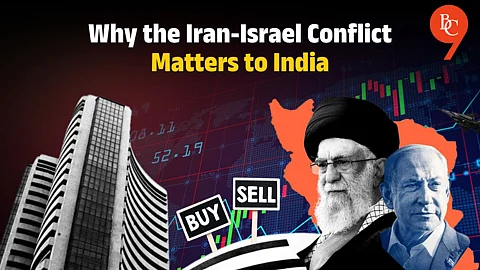

17 June 2025: The world is on edge as tensions between Iran and Israel heat up. Missiles are flying, oil prices are rising, and global markets are feeling the pressure. Even for India, thousands of miles away, the impact is real.
The Indian stock market, which has grown steadily in recent years, is now facing turbulence. The Sensex and Nifty are wobbling, investors are nervous, and there’s talk of a possible market crash. But how does this distant conflict affect your investments? What should you do to protect your money?
India may not be directly involved in the Iran-Israel conflict, but our economy still feels the heat because of oil. India imports about 80% of its crude oil, and the Middle East, including Iran, is a key supplier.
Iran is the third-largest oil producer in Organization of the Petroleum Exporting Countries (OPEC) and plays a big role in global oil markets. When tensions rise, like Israel’s recent strikes on Iranian nuclear sites or Iran’s missile attacks on Israel, the oil supply chain gets disturbed. The Strait of Hormuz, a critical route for oil shipments, could be blocked or disrupted. Any disturbance here means oil prices shoot up.
In June 2025, oil prices jumped 13% after Israel’s preemptive strikes on Iran. Brent crude is now around $75 per barrel, and experts warn it could go higher if the conflict continues.
Higher oil prices mean higher fuel costs for India. Transportation becomes expensive, inflation rises, and companies face higher production costs, squeezing their profits. This chain reaction shakes the stock market, as nervous investors start selling shares.
On June 13, 2025, the Sensex fell 900 points, and the Nifty dropped 1.3%, wiping out ₹2.4 lakh crore in market wealth. The message is clear: war in the Middle East rattles India’s financial system.
The Indian stock market is like a sensitive seismograph, picking up every tremor from global events. The Iran-Israel conflict has triggered high volatility in 2025.
Foreign portfolio investors (FPIs) are getting cautious. Wild swings in the Indian markets, along with geopolitical risks, are pushing them towards safer options like U.S. bonds or gold. On June 12, 2025, foreign investors sold Indian shares worth ₹3,831 crore, showing a clear sign of nervousness.
Luckily, Domestic Institutional Investors (DIIs) have provided strong support by buying shares for 18 days in a row. This has helped limit bigger losses but hasn’t stopped the decline entirely.
Sectors like aviation, energy, and logistics are feeling the pinch. Stocks of Interglobe Aviation (IndiGo), SpiceJet, and Adani Enterprises fell sharply due to higher fuel costs and global aviation worries.
Even giants like Reliance Industries, which rely heavily on oil refining, are under pressure as crude prices swing. Mid- and small-cap stocks, which had performed well recently, are now following the market’s downward trend. The Nifty is struggling to stay above 24,650, and analysts warn it could drop to 24,000 if tensions increase further.
The big question on every investor’s mind is: Is a stock market crash coming? No one knows for sure but let’s look at the signs. The Iran-Israel conflict has already triggered sharp corrections, with Sensex and Nifty losing 1–1.5% in a single day.
If the conflict escalates, for example, if Iran targets Israel’s oil facilities or the U.S. gets directly involved, oil prices could spike to $100 per barrel or more. This would be a nightmare for India, pushing inflation into double digits and squeezing company profits.
Experts say that if the Nifty falls below its support level of 24,250, it could drop further to 23,500 or even lower. A massive crash like the global financial crisis of 2008 is unlikely unless the conflict spreads to other major oil producers like Saudi Arabia. But prolonged uncertainty could keep markets weak, with frequent sell-offs and no clear recovery soon.
So, what should investors do? Don’t panic-sell; it only locks in your losses. Hold quality stocks like HDFC Bank or TCS for steady long-term returns. Diversify your portfolio across sectors like IT, pharma, and consumer goods to reduce risk. Add 5–10% gold ETFs as a safety cushion.
Use market dips to buy fundamentally strong stocks like Bharat Electronics. Avoid risky small-cap stocks for now. Keep 10–15% cash or invest in liquid funds to stay flexible.
Stay updated through trusted sources like RBI reports, don’t trust rumours or panic news. Consult a SEBI-registered financial advisor if you need help rebalancing your portfolio.
Note: Investing in the crypto market, stock market, or mutual funds involves risks. There is a possibility of loss as well as profit. Therefore, always consult your financial advisor before investing.
